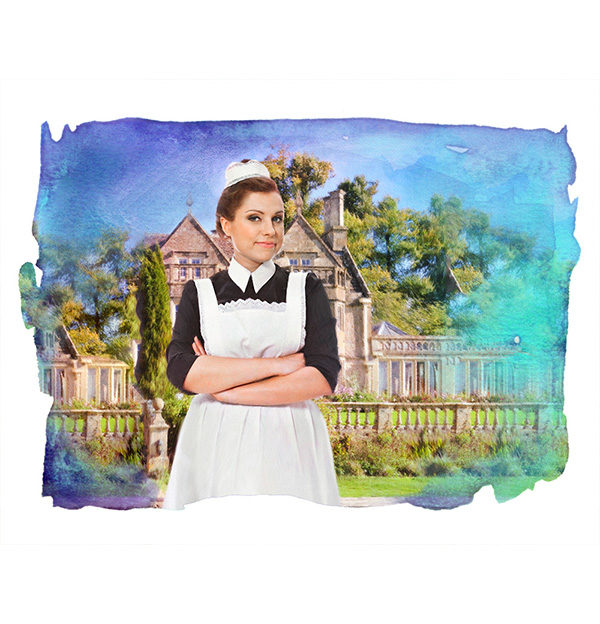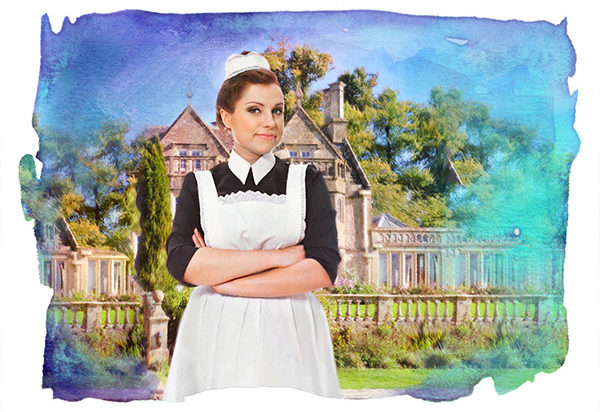Murder At Muirfield – Episode 15

Murder At Muirfield
« Previous Post- 12. Murder At Muirfield – Episode 12
- 13. Murder At Muirfield – Episode 13
- 14. Murder At Muirfield – Episode 14
- 15. Murder At Muirfield – Episode 15
- 16. Murder At Muirfield – Episode 16
- 17. Murder At Muirfield – Episode 17
- 18. Murder At Muirfield – Episode 18
IN the end, I was interviewed, too. The house was in uproar. Mrs Smith was tense, two lines bracketing her lips as she told us all that the policeman wanted to ask.
Mrs Pearson was complaining about her crockery. She needed to put it back in her cupboards. She’d no time to be interviewed. Sure, hadn’t she told Mr Sankey everything she knew already – which was nothing.
Janet was crying. No-one knew why. Gracie looked worried. If Arthur Sankey was taking May Litton’s disappearance seriously, then she felt at any moment she could be called home.
Mr Joseph vanished into his room. I guessed he was shifting bottles of wine in his cupboard so his theft wouldn’t be uncovered.
Only Bill was calm.
“I don’t know why Mr Sankey wants to talk to me,” I said, as we stood in the corridor waiting. “I wasn’t here when Ellen was killed.”
“Don’t be nervous,” Bill said. “It’s probably routine.”
“Bill,” I said slowly, “the other day . . .”
“Don’t mention it,” he said. “Really, it was nothing.”
I felt oddly lost and slightly flattened. So he hadn’t been bothered whether I went to the tearoom with him or not. Probably he only asked because Sarah wasn’t free.
Anyway, I didn’t care. I had Adam to think about. But it continued to rankle.
I glanced at him. His features were solemn. He wasn’t bad looking, I thought. He had a kind face. His jaw was square and strong. He was very tall, like all good footmen ought to be. There was also a slight gangliness to him which was endearing. I stopped there.
“Well, can we be friends?” I asked. A rare smile lit his face.
“Aye, friends it is, then.” I smiled, too.
“Hannah Miller.” Arthur Sankey’s booming voice called me in.
* * * *
The policeman had been given over Mrs Smith’s own room for use. I’d been in it only once – the day I arrived at Muirfield Hall.
The furnishings were plain but good quality. It was warm with a fire lit in the hearth and a stack of logs ready to add to it.
A brass bucket of coal stood there, too, and a hook of poker, tongs and brush. All was neat and perfect. Just like Mrs Smith herself.
“Did you know May Litton?” Arthur Sankey asked.
He had a notebook and pen at the ready. He rested it on his stomach as he sat in the only armchair.
I stood before him and was not offered a seat.
“No, I never met her.”
“Did you know Ellen Munroe?”
“No, she died before I came to Muirfield,” I told him.
“Where did you come from?” the policeman asked, taking notes.
“A county over.”
I described where my parents’ cottage was and the farming community they belonged to. He nodded. He obviously knew the place.
“Lastly, Hannah, have you noticed anything unusual since you got here?”
“I don’t know what you mean, sir.” He waved an arm in the air.
“People acting strangely, bumps in the night and so forth.”
Then it struck me. He didn’t have a clue. He was no closer to solving Ellen’s murder than I was. He was grasping for straws and May Litton’s disappearance was such a straw.
When I didn’t speak, he grunted.
“That will be all for now.”
* * * *
Every part of Muirfield apparently needed be taken apart and cleaned before the party. Not a rug or carpet was left unturned. The picture frames gleamed; the skirtings shone. The chandeliers were carefully lowered so that each individual crystal drop could be gently washed and dried. The air smelled sweet and lemony. The best beeswax candles were placed in sconces and candlesticks to supplement the gas lighting.
Janet was put to work by Mrs Pearson to clean all the pots and pans, bowls and cake tins in preparation for the cooking ahead. They were already clean, but poor Janet had to do them again. The cook watched with a frown. It was a serious business.
For my part, my task was unexpected.
Mrs Smith drew me to one side.
“Hannah, you must put on a clean apron and tidy your hair. You’re needed upstairs to help Sarah prepare the young ladies’ dresses. I know it’s unusual but Mrs Dawton is taking up all of Sarah’s time. We’ve a small staff here and I can’t see any other way round it.”
She sounded tired. It made me think. It was all very well having a shooting party, but there was no thought from the Dawtons to the extra burden placed on the servants. We had no voice in the matter.
If my mother had heard my thoughts, I knew what she would say: it’s not our place to argue. We’re lucky to be paid and to work.
While I was grateful for my job at Muirfield, I didn’t see why I should work like a slave. I didn’t warm to Mrs Dawton. She had no feeling for her maids, that was certain.
In any case, I nodded to the housekeeper.
“Yes, Mrs Smith, I’ll go directly.”
“You’re a good girl.” She smiled and patted my arm.
I was pleased. It warmed me that she thought well of me. I felt I’d settled in well and was amongst friends.
With a light heart, I changed my uniform and went upstairs.





